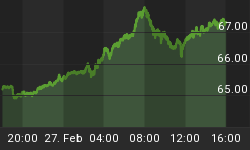While we're convinced that our gold and silver investments will pay off, they don't come without risk. What do you suppose is the biggest risk we face? Another 2008-style selloff? Gold stocks never breaking out of their funk? Maybe a depression that slams our standard of living?
Though those things are possible, we at Casey Research don't see that as your greatest threat:
"Your biggest risk is not that gold or silver may fall in price. Nor is it that gold stocks could take longer to catch fire than we think. Not even the prospect of the Greater Depression. No, your biggest risk is political. As bankrupt governments get increasingly desperate for revenue, any monetary asset held domestically could be a target. It is absolutely essential that every investor diversify themselves politically. In fact, at this point, it is the one action that should be taken before anything else." - Doug Casey, September 2011
I know many reading this are prudent investors. You own gold and silver as solid protection against currency debasement, inflation, and faltering economies. You set aside cash for emergencies. You have strong exposure to gold stocks, both producers and juniors, positioned ahead of what is likely the next-favored asset class. You feel protected and poised to profit.
Yet, despite all this preparation, you remain exposed to one of the biggest risks.
Similar to holding a diversified portfolio at a bank without checking the institution's solvency, many investors keep their entire stash of precious metals inside one political system without considering the potential trap they've set for themselves. While storing some of your gold outside your home country is not a panacea, it does offer one important thing: another layer of protection.
Consider the exposure of the typical US investor: 1) systemic risk, because both the bank and broker are US domiciled; 2) currency risk, as virtually every transaction is made in US dollars; 3) political risk, because they are left totally exposed to the whims of a single government; and, 4) economic risk, by being vulnerable to the breakdown of a single economy.
Viewed in this context, the average US investor has minimal diversification.
The remedy is to internationalize the storage of some of your precious metals. This act reduces four primary risks:
Confiscation: We don't know the likelihood of another gold confiscation. But we do know that things are working against us - particularly for US citizens. With $14.7 trillion of debt and $115 trillion of unfunded liabilities, the US government will likely pursue heavy-handed solutions. Under the 1933 FDR "gold confiscation" in the US (the executive order was actually a forced delivery of citizens' gold in exchange for cash), foreign-held gold was exempted.
Capital Controls: Many Casey editors think some form of capital controls lie ahead, limiting or eliminating a citizen's ability to carry or send money abroad. If enacted, all your capital would be trapped inside the US and at the mercy of whatever taxing and regulating schemes the government might concoct. Although you might be able to leave the country, your assets could not travel with you.
Administrative Action: There are plenty of horror stories of asset seizure by a government agency without any notice or due process, possibly leaving the victim without the means to mount a legal defense. Having some gold or silver stored elsewhere provides what could be your only available source of funds in such a scenario.
Lack of Personal Control: Having gold and silver stored elsewhere adds to your options. You will have a source of funds available for business, entrepreneurial pursuits, investment, or pleasure.
Notice above we said these risks can be reduced, not eliminated. There is no perfect solution; US persons could, for example, be compelled to pay a "wealth tax" on assets held worldwide, or even repatriate them in a worst-case scenario. Absent a crystal ball, the political diversity of asset location is an essential strategy against an uncertain future.
Foreign-held assets also require greater awareness and planning:
- Access to your metal or sale proceeds may not be quick. Therefore, this option is for those with some gold and silver stored at or near home. We do not recommend storing all your precious metals overseas; that defeats one of its purposes, to have it handy for an emergency.
- While we think the US poses the greatest threat, a foreign government could move to control certain assets as well. The risk varies by country and is generally greater within the banking system than with private vaulting facilities.
- Understanding and complying with reporting requirements is essential.
The bottom line, though, is that foreign-held precious metals can mitigate risk and give you more options. And as your metal holdings grows, diversification becomes more crucial.
Given our current rapacious climate, it's likely that simply buying gold won't be enough. We strongly suggest every investor diversify one's bullion storage outside their current political regime. The option may not be available someday, leaving you vulnerable without a secondary source of bullion.
We advise taking advantage of the opportunity before it is gone.
There are ways to invest in gold without paying current prices for the metal itself. Learn how big investment funds are accomplishing this today... and how you can do it, too, to maximize your profit potential.















